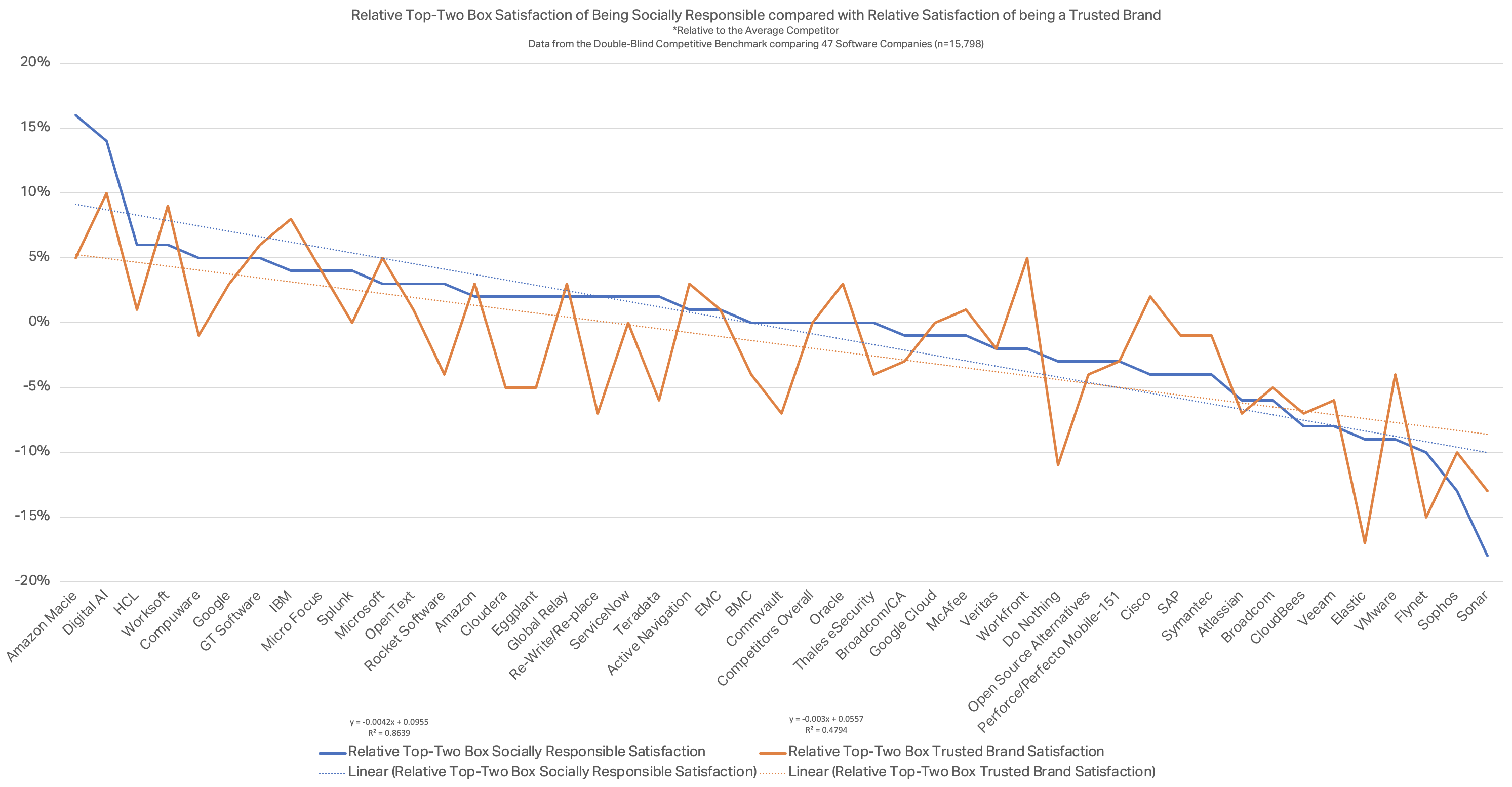How does social responsibility relate to customer trust?
Introduction
Social responsibility is no longer a ‘niche’, instead it touches every industry around the world, including the software industry. It is generally accepted that being socially responsible is increasingly important to customers within the software industry (Borderick et al. February 2021). However, the link between being a trusted brand and being socially responsible is yet to be explored. In this short article, we present data from the competitive benchmark, highlighting the positive correlation between how customers perceive social responsibility and the perceived trustworthiness of a brand.
Analysis
Indeed, in the latest competitive benchmark research, where we sample over 15,798 respondents across the software industry, we trend every brand, relative to the average performer, for how socially responsible and trusted they are seen by their customers. The results are quite clear, as figure 1 shows.

Figure 1: Relative Top-Two Box Satisfaction comparing every brand within software for being socially responsible and being a trusted brand as seen by their customers.
Calculating the specific r2 between being socially responsible and being a trusted brand, we find a value of 0.537, which shows a good positive correlation. From the data, software customers therefore ‘increasingly’ care about being socially responsible, and this is now proven to link to brand trust. Therefore, software vendors must ‘increasingly’ take this brand image attribute seriously.
What can we do about it and how is Micro Focus performing?
Environment considerations are extremely important to customers, and Micro Focus should therefore leverage the latest findings.

Figure 2: Ranking analysis for FY21’RQ3 customers across the whole software landscape comparing how socially responsible customers perceive the brand.
Figure 2 presents the latest socially responsible top-two box satisfaction for each brand* at the worldwide level in software. This percentage shows the number of customers responding with the top scores. To take the value of 50% as an example, a way of interpreting this would be that 1 in 2 customers liked how socially responsible the brand is, and, conversely, 1 in 2 did not. Generally, then, on average, all software companies are not seen as socially responsible (average is 54% top-two box satisfaction) and Micro Focus ranking, or performing, above the industry average, with a score of 58%, is a good feat. However, this also reveals that we have some way to go to be seen as an industry leader for social responsibility. However, we must remember that Micro Focus is ranked 4% higher than the average competitor. To draw comparison against some of our competitors, we rank: 1% higher than Microsoft, 2% higher than ServiceNow, 3% higher than EMC, 5% higher than Google Cloud, and 10% higher than Broadcom when it comes to social responsibility.
*Sample Size Worldwide: n=15,798. Micro Focus n=1,278, and all competitors n=14,520.
Conclusions
We know that being socially responsible is positively correlated with brand trust, and organisations must share, and communicate, ‘how’ environmentally friendly and socially responsible they are. This means we should think more about the broader vision behind our software, and how we can engage customers with this vision. To gain and maintain customer trust, it is critical that we accelerate and integrate social responsibility into every aspect of our company brand. We must give customers the visibility to make fair assessments of our technology, through consumer-level communication about product lifecycles, supply chains, and the environmental impact of our software. Transparency and traceability not only enhance customer trust, feedback, and satisfaction, but equally these extend to the stock market where investors are looking for investible and sustainable projects with good long-term value and rates of return. Clearly, stakeholders, asset owners, and customers all value and trust companies differently based on their commitment to social responsibility, and we should continue to consider our impact on people, communities, and climate goals as we build and transform the company roadmap.
This blog is co-authored by Dr. James D. Borderick and Rosalind Skillen.
This post was first first published on Home | Micro Focus Blog website by DrBorderick. You can view it by clicking here

